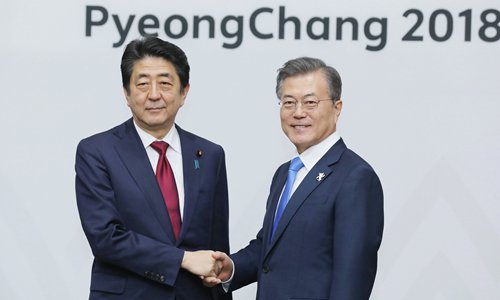HOME >> WORLD
South Korea, Japan in fresh spat over intelligence deal
Source:Reuters Published: 2019/11/25 22:08:40

Shinzo Abe, Moon Jae-in Photo: VCG
South Korea and Japan traded fresh barbs on Monday, just days after agreeing to salvage an important intelligence-sharing pact, highlighting the fragile ties between the former wartime foes and allies of the US.
Officials from each side criticized or contradicted comments made by the other side and in media about whether Tokyo had apologized over what Seoul said was an inaccurate weekend statement about the agreement.
Under pressure from Washington, South Korea made a last-minute decision on Friday to conditionally maintain the pact, known as GSOMIA, a dramatic about-face amid a months-long feud over history and trade.
GSOMIA, or the General Security of Military Information Agreement, is a key symbol of security cooperation between the two old foes and a trilateral partnership with the US.
Tokyo, for its part, said Seoul made a strategic choice and it hoped to hold trade talks, though it would not immediately restore South Korea's fast-track exporter status.
Officials at Seoul's presidential Blue House said on Sunday they had lodged a protest and received an apology over the Japanese trade ministry's announcement that it will continue enhanced screening on the exports of three core materials used in semiconductors, which they said was "completely different" to what was agreed.
On Monday, the Blue House singled out a report of Japan's Yomiuri newspaper quoting a Japanese foreign ministry official as saying it was "not true" that Tokyo has apologized.
"To clarify once again, we have complained and Japan apologized," senior press secretary Yoon Do-han said in a statement. "Japanese and Korean media are creating a truth game, but we know the truth."
Less than two hours later, Japan's Chief Cabinet Secretary Yoshihide Suga contradicted Yoon's remarks, saying the export curbs were "completely unrelated to GSOMIA."
"It is not productive to comment on every remark by South Korea, but it is not true that the Japanese government apologized," Suga told a press briefing.
The feud is rooted in a disagreement over compensation for South Koreans forced to work at Japanese companies during the 1910-45 occupation. After South Korea's Supreme Court ordered compensation last year, some former laborers are seeking to seize local assets of Japanese firms, and Tokyo imposed export controls.
Posted in: ASIA-PACIFIC